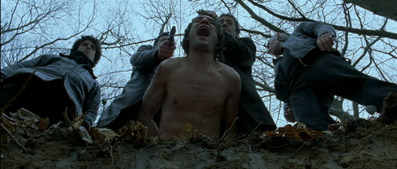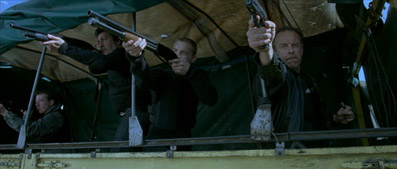|
You'd
be forgiven for having some seriously high expectations
for 36, or to give it its full title, 36:
Quai des Orfèvres. It's a police drama/thriller
directed by an ex-cop and starring the heavyweight duo of Daniel
Auteuil and Gérard Depardieu. And its been a good
few years since Bertrand Tavernier's superb L.627
pretty much set the bar for modern French policiers. So
is 36 the successor to the throne that
we've been waiting for? Well, not quite.
It
not hard to see why 36 has already been
snapped up for an American remake, despite the absence to
date of any sort of US distribution deal for the original.
You've got two seasoned detectives who were once friends
and are now rivals for the same promotional opportunity,
one a decent family man, the other a worn-down alcoholic,
both with young and good-looking women at their sides. They
are also both after the same gang of dangerous armed robbers,
whose arrest is the key that will open the door to
that upward career move. The good detective, Léo Vrinks (Auteuil),
becomes accidentally involved in an underworld murder, but
in exchange for providing an alibi for the killer (an ex-informant
of his), he is given the names of two of the
armed gang, the location of their hideout and information on their next planned hit. When
the operation to take the gang down kicks off, however,
not-so-good cop Denis Klein (Depardieu) compromises the
operation in an attempt to grab the credit for himself, a move
that results in the death of Vrinks' closest friend. Vrinks
becomes determined to see Klein punished for his actions,
but before he can testify against him, the news of his involvement
in the earlier killing falls conveniently into Klein's hands.

This
is not a police procedural in which we are invited to second
guess the detectives as they solve the crime – indeed, the
crimes themselves are largely background detail to the escalating
conflict between the two detectives. Pleasingly, there is
none of the "you son of a bitch!" finger-pointing
and furious fisticuffs we can at the very least expect from the
remake – the hostility here simmers beneath the surface
and anger is held in check, visible only in looks passed
across rooms or at funerals (there are more than one). The
drama is also dominated by an atmosphere of brooding melancholy, suggesting
that despite the emphasis on teamwork, this is an ultimately
lonely profession that puts damaging strains on friendships
and family. It can also, of course, get you killed.
Vrinks'
squad are in some ways indistinguishable from the villains
they chase down, something director Olivier Marchal plays
with effectively in the opening sequence, which cuts between
a violent robbery and a celebratory dinner with little initial
indication of who is who. As the newly transfered Eddy is presented
with the signature-plastered street sign of the title (the actual address of
the Paris police headquarters and seen stolen in the first
shots of the film), the suggestion
is of a crime boss given a trophy of victory against the
Sûreté, further emphasised when some of the
party shoot up the bar in celebration. When Vrinks and Eddy
arrive at a crime scene the following morning wearing police
overcoats, it's actually something of a jolt. They're not
above taking a bit of personal revenge, either, frightening
the living shit out of a suspect involved in the assault
and rape of a prostitute friend of Vrinks, an act that later
bounces back on one of them and provides the narrative with
a somewhat too-neat (but well-enough handled) ending.
With
the American remake on cards, it's only fair to point out
that 36 does its own share of borrowing
from Hollywood crime movies, something director Olivier
Marchal is not shy of admitting. There are clear influences
of Michael Mann's Heat in the early van
robbery and the later shoot-out between cops and robbers,
both of which are smartly staged. Not all of the borrowings
are such good news. Events are sometimes telegraphed well
in advance, quick flashbacks pop up to remind the inattentive
of earlier events, and the realism established elsewhere
is sometimes disregarded in order to startle the audience
– early in the film an arrest goes wrong when the suspect
grabs Vrinks and leaps through the window with him, but
he hits the ground first and was presumably squishy enough
to break the detective's fall, allowing Vrinks to escape
with a couple of minor facial cuts.

Despite
the initial suggestion of the police as hoodlums with badges,
36 lacks the intriguing moral ambiguity
that allowed us to simultaneously
root for both sides in Heat. The film increasingly demonises Klein by piling
on the moral and ethical crimes he commits against Vrinks
in order to shape the final quarter into a revenge drama, then
introduces an element that will allow Vrinks to find a
moral high ground that the audience will feel comfortable
with. Not that any of this is a problem – it's certainly
well enough done – but it does tread very familiar turf,
making for a safer entertainment than the edgily low key
handling initially suggests. Where the film does
trip up a bit is in the music, which although fine for the
most part is sometimes overwrought to the point of cinematic
cliché, something also evident in the night time
prison exterior that's accompanied by the anguished bellow of "Noooooo!"
But
36 is still a solid and enjoyable police drama shaped largely
from Marchal's own experiences in the force. If Depardieu
tends to sink into the background a little in a deliberately
underplayed performance, Auteuil again makes his mark as
a very effective leading man, his good looks having the
weathered edge of a seasoned professional, but still physically
agile enough to disarm two officers in a blink of an eye
without stretching credibility. In an interview on the extra
features, Marchal expresses his scorn for French minimalist
cinema and his determination to make an entertainment rather
than an art film. In this he certainly succeeds, but it
is that willingness to both give the audience what they
want and yet still challenge their expectations that makes
Mann's and Tavernier's films so special – in cinema,
a little art can sometimes go a long way.
Framed
2.35:1 and anamrophically enhanced, this is a very decent
transfer of a film whose unglamorous locations and sometimes
dark interiors do not make life exactly easy for DVD authoring.
Contrast is largely impressive, though there are odd darkened
interior shots where black levels are not quite there (a
compromise to retain the shadow detail, perhaps). Detail
is good and colour reproduction appears to be bang on.

The
usual Tartan trio of Dolby 2.0 stereo, Dolby 5.1 surround
and DTS surround are offered, with DTS coming out on top
for punch, volume and dynamic range, though the 5.1 is no
slouch. The full sound stage is very effectively used here
and the difference between the quietest and loudest sounds
can be substantial, giving me (and doubtless my neighbours)
a fair few jolts, and LFE bass makes several ornament-rattling
appearances. The explosive gun battle between the police
and the armed gang in particular is a home cinema show-off
scene, placing you right in the middle of the action, much
as you were with, you've guessed it, a similar if larger
(and longer) scene in Heat.
It
should be mentioned that there also is a Dolby 2.0 English
dub included. Apart from the hopeless mismatch of words
and mouth movements and the absurdity of hearing Auteuil
and Depardieu sporting American tough guy accents, these
voices have to a large extent not been effectively mixed
with the ambient sound, having none of the location acoustics
and thus sounding very much like the add-ons they are.
The
subtitles, though clear, appear to be less a direct translation
of the French dialogue than a textual adaptation of the
English language dub, which has been altered from the original
to suit differences in the sentence length and localised
colloquialisms of the two languages. You only need a basic
familiarity with French to start spotting the small differences.
In
the Olivier Marchal Interview
(9:37) the director talks about the autobiographical elements
of the film, working with such famous leads, the level of
authenticity of some elements and the macho aspect of the
male characters. As mentioned above, he also emphasises
that he made the film not as art but for an audience, but
as with others who have made this claim he does not elaborate
on what he believes the expectations of his selected audience
actually are, or address the fact that such expectations are
far from universal.
Making
36 (27:42) is a decently shot and assembled
behind-the-scenes documentary that observes in some detail
the filming of several scenes, largely uninterrupted by
interview material or extended film clips. It's a consistently
interesting and well balanced piece, and pleasingly includes
a few technical hiccups and some director frustration. Marchal,
dressed in a leather coat and directing with his entire
body, looks very much like one of Vrinks' hard-arse gang
of detectives, which of course he once was. Optional English
subtitles are provided, as they are with all of the extra
features.
Choosing Costumes (13:41) is a partially self-explanatory
title for a DV featurette that also provides an engaging
and busy behind-the-scenes peek at the cast and director
preparing for the shoot.
Choosing
Weapons (13:09) is done in similar style and
should have gun nuts slobbering with glee, as director Marchal
and his associates get to do the boys-with-toys thing when
they are shown a whole range of deadly weapons and get to
coo at their magnificence. The process of selection is nonetheless
interesting.
Finally
we have the Original Trailer (2:00)
and the Teaser Trailer (0:52)
do a good job of selling the film, though there are a couple
of spoilers in here, so these are for later.
36
is an involving cop drama that falls short of greatness
through the familiarity of many of its elements and some
play-it-safe work on the plotting and characterisations.
It's well worth seeing nonetheless, for its two leads, its
assured handling and for its sense of a system struggling
as much with itself as with those it is in existence to
combat. Tartan's DVD does well on picture, very well on
sound, and has a selection of worthwhile extras. If you're
a fan of the genre or already have a soft spot for the film,
then the DVD will not disappoint.
|